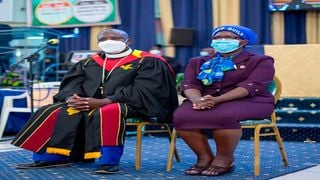
Rev George Obonyo and his wife, Jacinta Mukari, during his induction in Kariobangi South, Nairobi.
| Jeff Angote | Nation Media GroupNews
Premium
Deaf PCEA cleric defies odds to rise to the helm of church parishes
The passion with which Rev George Obonyo Orwongo preaches the gospel is not the only reason for his popularity among the congregation.
The Presbyterian Church of East Africa (PCEA) cleric, who is deaf and preaches through a sign-language interpreter, is considered a one-of-a-kind blessing. And it is a double blessing as his wife, Jacinta Mukari, who is also deaf, preaches in the church as well.
Last Sunday, Rev Obonyo’s work in the ministry was rewarded when he was elevated to be in charge of the Nairobi East Presbytery that comprises 14 parishes.
His induction happened at the PCEA Kariobangi South church. He will also be in charge of special ministry, reaching out to the members living with disabilities.
Despite getting disabled early in life, he grew up to become a preacher, a role he says is both a passion and a calling.
“I began as a choirmaster and a praise-and-worship leader, which later graduated to a preacher. Nothing could stop me as my vision was growing clearer by the day. Since I can’t speak, I use sign language to preach then someone interprets the sermon to the congregants,” says Rev Obonyo, through an interpreter.
He was born and raised in Kisii County, the fifth born in a family of six. “I was born a normal child and my hearing was functioning normally. But when I was about three or four years old, I fell sick. I’m told I was admitted to the Kisii (District) Hospital for two months. I was then operated on to save my life, but sadly I lost my speech and hearing ability in the process,” says Rev Obonyo.
He attended Kuja Primary School for the Deaf between 1981 and 1991. Later, he pursued a diploma in pastoral theology from 1995 to 1999.
Rev Obonyo noticed that it was close to impossible to be a man of the cloth without being a counsellor given the issues that would arise on his normal day at work. That’s how he went for a counselling programme with the Kenya Association of Professional Counsellors. He furthered his knowledge in the field by taking courses in good governance and godly leadership.
“You can’t hold on to one line of thought to grow your knowledge, and that’s why I keep furthering my education ever since I decided that ministry is what I want to do for life.
“I have a number of certificates in my closet, including a certificate in mission and evangelism from the Presbyterian University of East Africa and I’ll keep acquiring more. I am also a qualified first aider. This far the Lord is my Ebenezer. Glory be to His name,” says Rev Obonyo.
Rose through the ranks
Rev Obonyo was baptised in 1991 at Lutheran Church in Kisii County. He was later confirmed at Presbyterian Church of East Africa, St Andrew’s Church, in the Milimani Presbytery.
While serving at PCEA St Andrew’s Church, he was the praise and worship leader for the deaf. He also served as an evangelist, a deacon and was an active member of the Deaf Ministry.
Rev Obonyo was received in PCEA Kariobangi South Parish on May 11, 2019, as a student minister to serve under the mentorship of Rev George Wamani. After successful completion of the programme, he was licensed to serve as a PCEA church minister on November 10, 2019. He was subsequently ordained in December 2019 at PCEA Kariobangi South Church, by the Nairobi East Presbytery.
To minister to the deaf, Rev Obonyo believes one must understand from personal experience the distinctive spiritual challenges non-hearing people face, holding that the deaf have a distinctive culture, language and worldview and that he is called to bridge that gap between the deaf community and the hearing world.
He has campaigned to have Bible-reading done in deaf culture and braille-reading in church. The preacher has also championed the deaf involvement in prayers through sign language—a practice now being embraced in most PCEA churches.
Rev Obonyo says that neither offering sign language interpretation in a predominantly hearing congregation nor providing closed captions on a video monitor is adequate to meet all the needs of the deaf community.
“Abstract theological concepts do not necessarily translate easily into sign language, and the deaf have a different learning style than the majority population. Their learning is more visual, creative and practical. They would need to see visual explanations, such as the use of PowerPoint slides or other visual aids, either in the classroom or during a service,” he explains.
“Worship is different, as well. They can’t hear the music. They would want you to crank up the volume as high as it can go. They love it that way. The deaf can feel its vibrations from the loudness,” he adds.
He got married to Jacinta in 1999 and they are blessed with three children. Both Rev Obonyo and his wife are ordained ministers as per the PCEA practice where a man is ordained together with his wife. Mr Anthony Omari, a friend of the Obonyos, said their story offers hope to many.
“He is a role model to persons with disabilities. To the parents of challenged children, it gives them hope that it is not the end of the road for their children and that there is still a lot that they can achieve in life,” said Mr Omari.




